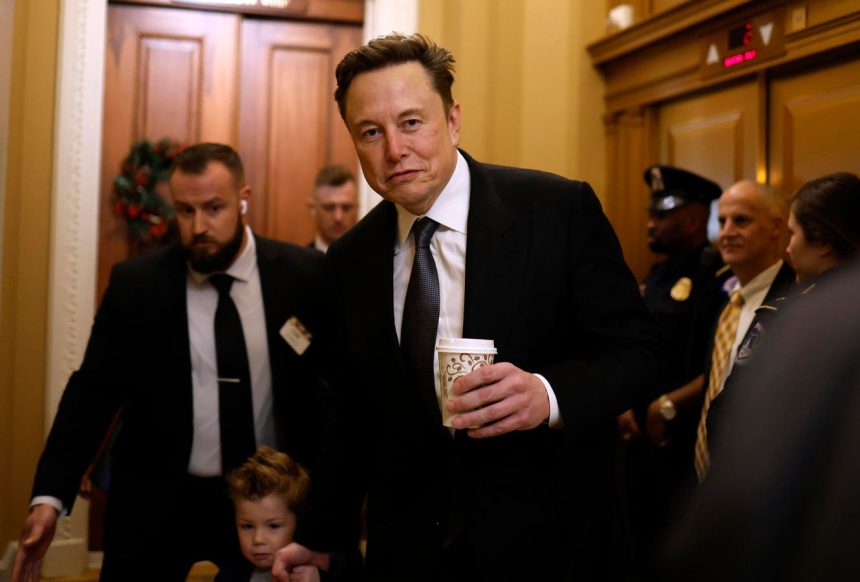Elon Musk’s foray into British politics has taken a dramatic turn, marked by his unexpected call for a leadership change within the right-wing Reform Party. Just weeks after meeting with party leader Nigel Farage at Mar-A-Lago, Musk publicly declared on X (formerly Twitter) that Farage lacks the necessary qualities to lead the party, leaving many to speculate about the reasons behind this sudden shift in allegiance. Farage, surprised by the public rebuke, attributed Musk’s criticism to his own refusal to endorse Tommy Robinson, a far-right activist with a criminal record and a history of inflammatory rhetoric. This disagreement highlights a growing tension within the right-wing spectrum, with Musk seemingly aligning himself with more extreme elements. Musk’s intervention in British politics follows a pattern of engaging with and endorsing right-wing figures globally, including expressing support for conservative movements in Germany, Italy, and Canada.
The controversy surrounding Tommy Robinson further illuminates the complexities of Musk’s political affiliations. Robinson, known for his anti-immigrant stance and various legal battles, has become a focal point in the ongoing debate about free speech and extremism. Musk, a self-proclaimed free speech absolutist, has amplified Robinson’s calls for release from prison, while Farage has distanced himself from the activist, citing Robinson’s divisive rhetoric and unwillingness to adhere to the Reform Party’s principles. This clash reveals a nuanced disagreement within the right-wing movement, with Farage attempting to maintain a degree of mainstream appeal, while Musk appears more willing to embrace controversial figures. The situation underscores the challenges of navigating the political landscape in the age of social media, where influential figures like Musk can exert considerable sway over public opinion and political discourse.
Musk’s interest in British politics extends beyond the Reform Party leadership. He has repeatedly criticized Labour Party leader Keir Starmer, accusing him of mishandling issues such as online hate speech and the response to riots. He went so far as to call on King Charles to dissolve Parliament and call for a new general election, based on allegations that Starmer failed to adequately address “grooming gangs” during his tenure as director of public prosecutions. This accusation, often leveraged by the right against the left, centers around the exploitation of children in northern England, with the perpetrators predominantly being British-Pakistani men. The issue has become a rallying cry against immigration and a tool for political point-scoring. Musk’s involvement in this highly sensitive and complex issue further demonstrates his willingness to wade into contentious political battles, often with inflammatory rhetoric.
Beyond the UK, Musk’s political engagements have sparked controversy in other countries. He penned an opinion piece defending Germany’s far-right AfD party, disputing claims that it is extremist and arguing that it could revitalize the German economy. This intervention drew significant backlash, including the resignation of a prominent newspaper editor. In Italy, he criticized judges who struck down an anti-immigrant initiative, prompting a rebuke from the Italian president. His close relationship with Italian Prime Minister Giorgia Meloni, a right-wing figure, further highlights his affinity for conservative leaders. In Canada, he clashed with Prime Minister Justin Trudeau, labeling him an “insufferable tool” and predicting his imminent downfall. These international engagements demonstrate Musk’s increasing willingness to challenge established political figures and institutions, often aligning himself with right-wing populist movements.
Musk’s political activities are intertwined with his vast wealth and influence. Having spent over $200 million supporting Donald Trump’s 2024 presidential campaign, he has become a key ally of the former president, regularly seen at Mar-A-Lago and slated to lead a cost-cutting initiative within a potential Trump administration. This financial backing, coupled with his massive social media presence, grants Musk significant leverage in the political arena. His transformation from an Obama supporter to a Trump ally reflects a broader shift in his political views, characterized by an embrace of conservative and populist ideologies. This evolution has raised concerns about the potential impact of billionaires wielding such significant political influence, particularly in the context of social media platforms that can shape public discourse and amplify specific viewpoints.
The multifaceted nature of Musk’s political engagements paints a complex picture. While he champions free speech, his support for controversial figures and his inflammatory rhetoric raise questions about the boundaries of acceptable discourse. His willingness to challenge established political figures and institutions, coupled with his immense wealth and influence, creates a unique and potentially volatile dynamic in the global political landscape. His actions underscore the growing power of individuals like himself to shape public opinion and influence political outcomes, raising crucial questions about the role of wealth, technology, and social media in the future of democracy. As Musk continues to engage in political discourse across the globe, his impact will undoubtedly be closely scrutinized, with both supporters and critics analyzing the implications of his actions for the future of politics and society.



